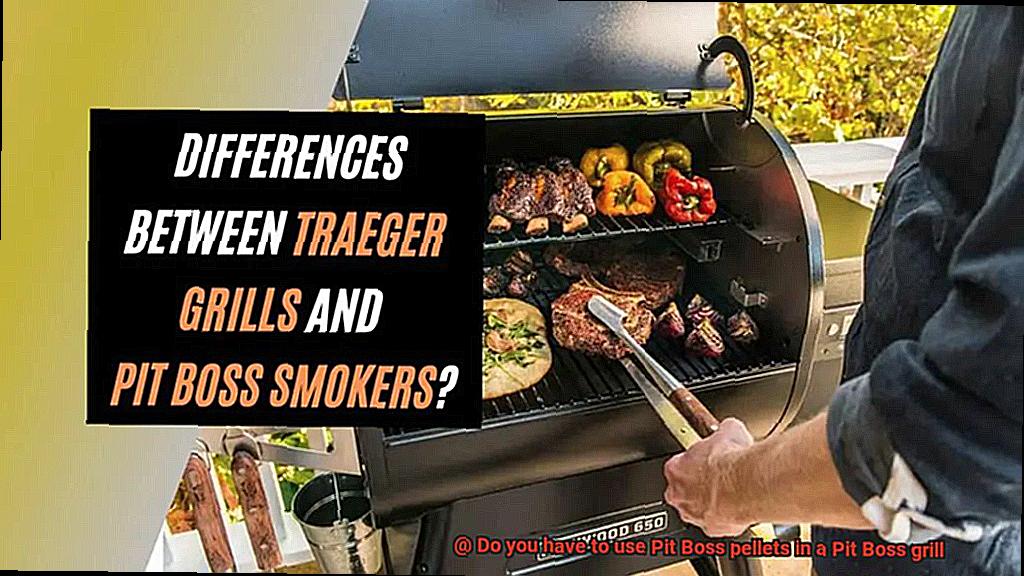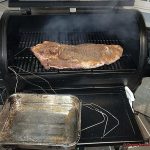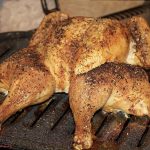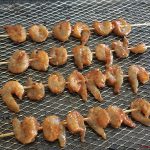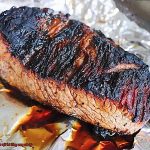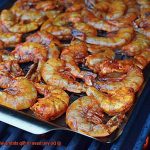Do you own a Pit Boss grill and find yourself wondering if their branded pellets are necessary for the ultimate grilling experience? Are you constantly asking yourself, “Do I really need these pellets, or can I just use any other brand?” Well, fret no more because you’re not alone in this dilemma.
The type of pellet fuel you choose is crucial to achieving that smoky, aromatic flavor we all crave in our food. But with countless pellet brands available in the market, it can be challenging to determine which ones to use.
In this blog post, we’ll explore whether or not you need to use Pit Boss pellets in a Pit Boss grill. We’ll take a closer look at the features and characteristics of these pellets and compare them to other pellet brands on the market. By doing so, we’ll provide you with a better understanding of whether or not you should stick to Pit Boss pellets for your grill.
So, sit back, relax, and let’s dive into the world of pellet grilling. We’ll help you decide what kind of pellets to use for your next BBQ party so that you can impress your friends and family with some mouth-watering, smoky-flavored grilled dishes that will leave them wanting more.
Contents
What Are Pit Boss Pellets?
These all-natural BBQ wood pellets are specially designed to work with Pit Boss grills, which have a unique auger system that feeds the pellets into the firepot at a precise rate to ensure consistent heat and smoke output.
Made from compressed sawdust, wood shavings, and natural hardwoods, Pit Boss pellets offer a wide range of flavors that can enhance the taste of your grilled or smoked meats. With popular flavors like hickory, mesquite, apple, cherry, and maple, you can choose the perfect flavor profile to suit your taste buds.
One of the most appealing features of Pit Boss pellets is that they are 100% all-natural and contain no fillers or additives. This means that they burn cleanly and leave behind minimal ash, making them ideal for grillers who don’t want to spend too much time cleaning up after their cookouts. Plus, since Pit Boss pellets are made from high-quality hardwoods, they offer a superior flavor compared to other types of pellets that may contain fillers or low-quality woods.
Another benefit of using Pit Boss pellets is that they offer exceptional performance in Pit Boss grills. While it is possible to use other brands of pellets in a Pit Boss grill, using Pit Boss pellets ensures the best possible performance and flavor. This is because these wood pellets are specifically designed to work with the unique auger system in Pit Boss grills, which feeds the pellets into the firepot at a precise rate to ensure consistent heat and smoke output.
If you’re worried about compromising your grill’s warranty or damaging your grill by using other brands of pellets, then Pit Boss pellets are your safest bet. Not only do they ensure optimal performance and flavor in your Pit Boss grill, but they also offer peace of mind knowing that you’re using a product that is specifically designed for your grill.
Do You Have to Use Pit Boss Pellets in a Pit Boss Grill?
So, you’ve got your hands on a shiny new Pit Boss grill, and you’re excited to start grilling up a storm. But before you fire up the grill, the question arises: do you have to use Pit Boss pellets in your Pit Boss grill? The answer is no, but there are certain factors to consider when choosing the right pellets for your grill.
First and foremost, it is essential to note that using non-Pit Boss pellets may void your warranty. However, if that’s not a concern for you, then you have an extensive range of options to choose from. The key is to pick high-quality pellets made from hardwoods like hickory, mesquite, or applewood. These types of pellets will enrich the flavor of your food with their rich and smoky taste. Avoid pellets made from softwoods like pine or cedar as they can produce a bitter taste.
Another important consideration is the size of the pellets. Different brands may have varying sizes, and it’s crucial to ensure that the pellets fit correctly in your grill’s hopper. If you use pellets that are too large or too small, it can result in uneven heat distribution and potential damage to your grill.
Lastly, some pellets may produce more ash than others. This can affect the performance of your grill and require more frequent cleaning. It’s always advisable to read reviews and conduct research on the specific brand and type of pellets before making a purchase.
Considerations Before Using Non-Pit Boss Pellets
Before you do, there are a few important considerations to keep in mind.
Firstly, using non-Pit Boss pellets could potentially void your warranty. Pit Boss grills are designed to work seamlessly with their own brand of pellets. Using other brands may cause damage or malfunctions that could lead to expensive repairs. So before making the switch, read the fine print on your warranty and make sure you understand the potential risks.
The quality of the pellets you choose is another crucial factor to consider. Pit Boss pellets are made from 100% natural hardwoods with no fillers or additives. This ensures a consistent burn and flavor profile for your food. Non-Pit Boss pellets, on the other hand, may contain additives or fillers that can affect the taste of your food. Do some research and choose wisely to ensure the best quality and taste for your grilling experience.
It’s also essential to note that not all wood pellets are created equal. The type of wood used in the pellet can greatly affect the flavor of your food. Pit Boss offers a variety of flavors like hickory and mesquite, but if you decide to use non-Pit Boss pellets, make sure to consider the type of wood used and how it will affect your food’s flavor.
Finally, consider the cost of using non-Pit Boss pellets. While they may be cheaper upfront, they may not offer the same quality or consistency as Pit Boss pellets. Inefficient burning could mean using more pellets overall, which could end up costing you more in the long run.
Types of Non-Pit Boss Pellets to Use
When it comes to grilling, the right type of pellet can make all the difference in your dish’s flavor and quality. While Pit Boss recommends using their own brand of pellets, there are many other options available on the market that can provide a wider range of flavors for grilling enthusiasts. Let’s take a closer look at the different types of non-Pit Boss pellets you can use in your Pit Boss grill:
Traeger Pellets
Made from high-quality hardwoods, Traeger pellets are a popular choice for grilling enthusiasts. They come in a variety of flavors, including hickory, mesquite, and apple, and are compatible with Pit Boss grills. Whether you’re smoking or grilling, Traeger pellets can provide a rich and smoky flavor to your meats.
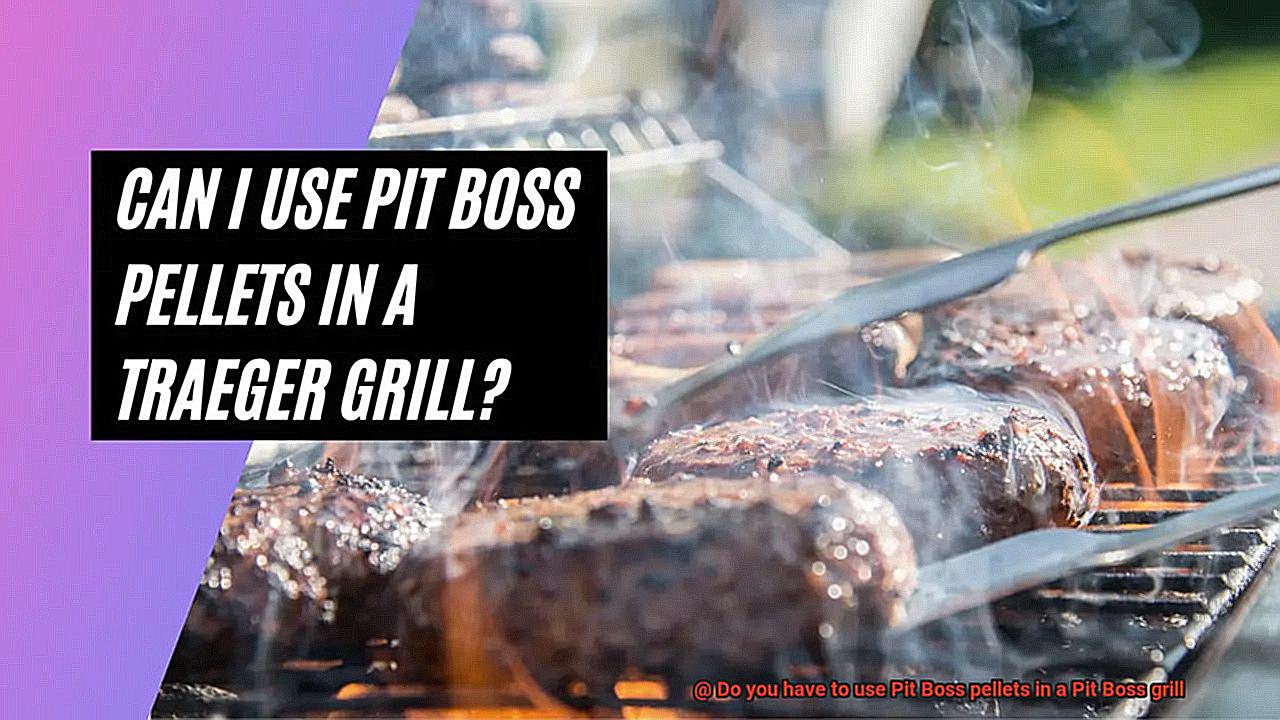
Lumberjack Pellets
If you’re looking for a natural wood composition with no additives or fillers, Lumberjack pellets are an excellent choice. They come in a range of flavors, including cherry, maple, and oak, and can be used in Pit Boss grills with great results. Lumberjack pellets are known for their consistent quality and ability to impart a robust flavor to your grilled meats.
Specialty Pellets
For those who love experimenting with flavors, specialty pellets like fruitwood or wine-infused pellets can provide unique and delicious flavor profiles to your grilled meats. These types of pellets are compatible with Pit Boss grills and can give your dishes a one-of-a-kind twist.
Bear Mountain Pellets
Made from premium hardwoods like alder, maple, and hickory, Bear Mountain pellets are specially formulated to provide a clean burn and strong smoky flavor. These high-quality pellets work great in Pit Boss grills and are loved by many grill enthusiasts for their ability to enhance the flavor of their meats.
High-Quality Pellets
Regardless of the brand you choose, it’s important to look for high-quality options that are made from 100% hardwoods and do not contain any fillers or additives. Look for pellets that have been tested and certified by a reputable organization like the Pellet Fuels Institute to ensure optimal results.
Benefits of Using Non-Pit Boss Pellets
It might be time to switch things up and try non-Pit Boss pellets. As an expert in the field, I can tell you that there are many benefits to using non-Pit Boss pellets in your grill.
Firstly, let’s talk about cost savings. While Pit Boss pellets are known for their high quality, they can be quite expensive compared to other brands. By branching out and trying non-Pit Boss pellets, you can save money without sacrificing flavor or quality.
But that’s not all. Non-Pit Boss pellets offer a wider variety of flavors than Pit Boss alone. While Pit Boss has plenty of flavors to choose from, other brands may offer unique or niche options that you won’t find with Pit Boss. This opens up a world of experimentation and customization to your grilling experience. Imagine the possibilities of trying out a new flavor like applewood or hickory.
Moreover, some users have reported that non-Pit Boss pellets produce less ash than Pit Boss pellets, making for easier cleanup and maintenance of your grill. Who doesn’t love an easier clean-up process?
Of course, it is crucial to ensure that the non-Pit Boss pellets you choose are compatible with your specific Pit Boss grill model. Using incompatible pellets can lead to poor performance or even damage to your grill. Always check the manufacturer’s recommendations before making a purchase.
Potential Drawbacks of Using Non-Pit Boss Pellets
Attention all grill masters. It’s tempting to try and save a few dollars by using non-Pit Boss pellets in your Pit Boss grill, but doing so can lead to several potential drawbacks that may negatively impact the quality of your food and the performance of your grill.
Firstly, using subpar pellets can significantly impact the taste and texture of your food. The Pit Boss grills are designed to work seamlessly with their own branded pellets, which are made from high-quality hardwood and contain no fillers or additives. Using other brands of pellets can result in uneven heating, inconsistent smoke production, and a lack of flavor in your food, which is not what you want when grilling.
Moreover, using non-Pit Boss pellets can also void your warranty. Many manufacturers, including Pit Boss, require the use of their branded pellets to ensure that the equipment operates as intended. If you end up causing damage to your grill by using other pellets, you may be stuck paying for repairs out of pocket.
Besides, non-Pit Boss pellets may not be compatible with the auger system of your Pit Boss grill. The auger system is responsible for feeding pellets into the fire pot. Using pellets that are too large or small can cause jams and other mechanical issues that could ruin your cookout.
Finally, using non-Pit Boss pellets may not deliver the same consistent heat output as using Pit Boss pellets. This can affect cooking times and temperatures, making it difficult to achieve the desired level of doneness for meats and other dishes.
Tips for Choosing High-Quality Non-Pit Boss Pellets
There are plenty of high-quality non-Pit Boss pellets available that can provide the same great flavor at a lower cost. However, it’s important to choose the right pellets for your grill to avoid any damage or unsavory flavors.
Here are some tips for selecting the best non-Pit Boss pellets:
- Opt for 100% hardwood pellets. These types of pellets burn hotter and cleaner than blends of hardwood and softwood, resulting in a better flavor profile for your food.
- Check the moisture content. Pellets with less than 6% moisture burn more efficiently and produce less ash and smoke, making them ideal for use in your grill.
- Avoid pellets with filler materials. Some manufacturers add filler materials like corn or soybean oil to save on costs, but these can negatively impact the flavor of your food and harm your grill’s heating element over time.
- Choose a reputable brand with a good track record of quality and consistency. You can read reviews online or ask other grill enthusiasts for recommendations.
- Experiment with different flavors to find your perfect match. Non-Pit Boss pellets come in a variety of flavors, such as mesquite, apple, or cherry, so try out different options until you find one that suits your grilling needs.
It’s also important to consider the type of wood used in the pellets. Different woods will produce different flavors, so choose one that complements the dish you’re grilling. For example, hickory is great for smoking pork or beef, while fruitwood like apple or cherry is better suited for poultry or fish.
In addition to wood type, pellet size and shape are also crucial factors to consider. Look for uniform pellets that will feed properly into your grill’s auger system to ensure consistent heating and avoid any jams or malfunctions.
Xm1qgl1breU” >
Conclusion
As we wrap up our exploration of whether Pit Boss pellets are a must-have for your Pit Boss grill, it’s clear that they offer exceptional performance and flavor. However, using non-Pit Boss pellets is possible with some important considerations.
If you opt for non-Pit Boss pellets, it’s crucial to choose high-quality options made from 100% hardwoods without any additives or fillers. You’ll also want to consider the type of wood used in the pellet, as well as its size and shape compatibility with your grill’s auger system.
While there are benefits to using non-Pit Boss pellets – including cost savings, wider flavor options, and less ash production – there are also potential drawbacks. Using incompatible pellets could void your warranty or cause poor performance or damage to your grill.
In summary, while Pit Boss pellets ensure optimal results in your Pit Boss grill, high-quality non-Pit Boss pellets can provide a wider range of flavors at a lower cost. Ultimately, it’s important to weigh the pros and cons before making a decision and always follow manufacturer recommendations for best results.

